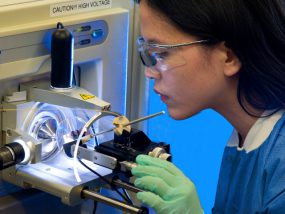HoSt/VDSCP: Hormone and Vitamin D Standardization Programs

CDC Hormone and Vitamin D Standardization Programs improve the diagnosis of polycystic ovary syndrome, certain cancers, and other diseases of hormone excess and deficiency. The program assists in providing more accurate and precise hormone measurements used in patient care and research, specifically testosterone, 25-hydroxyvitamin D, and estradiol.
The Clinical Chemistry Branch, Division of Laboratory Sciences conducts this voluntary program. The program is nonregulatory, and it helps clinical, research, and public health laboratories maintain and enhance the quality and comparability of measurement results obtained from steroid hormone and vitamin D tests.
Better laboratory data will
- Assure consistency in patient care and public health efforts
- Enable the use of general reference ranges to identify individuals or population subgroups with unsafe levels
- Minimize retesting of patients referred to another doctor
- Optimize the use of research findings by enabling pooling of data from different research studies
- Improve patient care through faster transfer of research findings to patient care and public health
The program provides services to laboratories, to manufacturers of diagnostic products, and to organizations involved in proficiency testing/external quality assessment schemes. Below are some of the services the hormone standardization program provides:
- Standardization of measurement procedures (Laboratory/Manufacturer Hormone Standardization Program – HoSt Program and Vitamin D Standardization – Certification Program – VDSCP)
- Reference measurements services (in serum and other specimens used in calibration or calibration verification)
- Technical training and consultation on measurements
- Studies and study support to assess assay performance and help identify and address measurement problems
- Studies and study support to characterize materials intended for use as calibrators or trueness controls (i.e., commutability studies)
- Studies to define normal ranges and describe biological variability
- Guideline development
This program is endorsed by 14 professional and medical organizations.
If you are interested in participating in this program, please click the links above to see an overview of each aspect of CDC’s Hormone and Vitamin D Standardization Programs.